How does a gas stove work: the principle of operation and the design of a typical gas stove
It is difficult to imagine modern life without kitchen appliances - with its help we cook dinner, bake pies, store food, indulge ourselves with fresh coffee in the morning. And among the numerous equipment stands out a stove that has successfully replaced at one time a home hearth - a stove.
The population of gasified territories living in low-rise and private houses uses gas-fired stoves. If this tireless assistant has also settled in your kitchen, we suggest that you figure out how the gas stove works, what parts it consists of and how to increase its life.
Our tips will help you take care of the equipment and respond correctly if it fails.
The content of the article:
Design and principle of operation of the gas stove
If you use cooking equipment daily, you know very well what parts it consists of and how it works.
In their structure, all gas stoves are very similar, and the differences relate to the design or design features associated with additional functions.
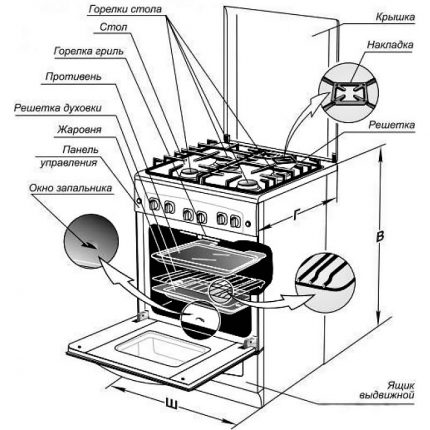
Modern manufacturers specializing in the manufacture of kitchen equipment, are trying to diversify the model range due to the more convenient location of burners and control panel, internal filling of the oven, introduce electronic filling.
At the installation site, gas stoves are divided into outdoor and tabletop. The latter is more often used as a summer residence or temporary option. Also emit autonomous cooking surfaceswithout an oven that can be built into the countertop.
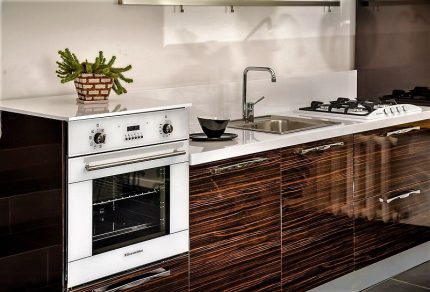
But you need to consider that the simpler and more primitive the design of the plate, the easier its maintenance. Inexpensive equipment, which is often purchased for installation in cottages, lasts a long time - there is no electronics in it, and parts that can break down are always easy to replace.
Overview of the main elements of a gas stove:
In addition to these elements, more complex and expensive equipment has additional details. it electric ignition unit and electronicsregulating the operation of the oven.
The latest models are produced with a pre-installed gas leakage control system: if the flame accidentally goes out, the fuel supply instantly shuts off in automatic mode.
We consider in more detail the elements directly involved in the workflow.
Hob structure
Nobody calls the top plane with hobs located on it now a “table”, more often they use the name “stove” or “hob” - if we are talking about built-in appliances. This is the element most often involved in the cooking process, and therefore requires regular care.
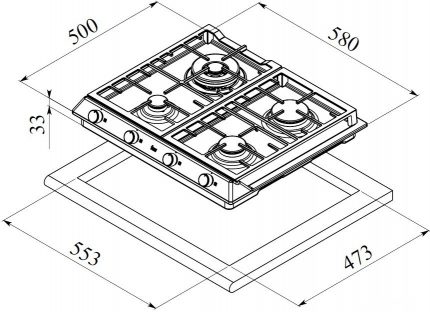
In low-cost models, the upper plane, like the entire case, is coated with enamel. If it looks attractive with a new product, then in the future the appearance of enamel deteriorates significantly: cracks and chips appear that complicate care.
A stainless steel stove also needs careful care. Matte or glossy surfaces do not like to be rubbed with metal brushes.
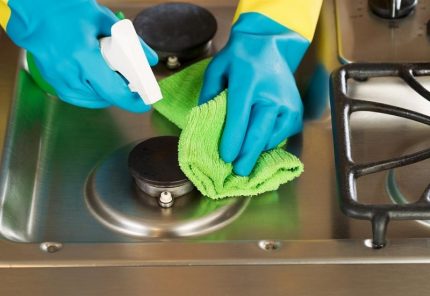
Abrasive products in the process of caring for kitchen appliances should never be used.
Well, the main working elements on the hob are still the burners, which, if used improperly or poorly maintained, can quickly fail.
How is a gas burner arranged?
In household appliances, flame injection multi-torch burners are used. The principle of operation of any gas stove is based on the combustion process that occurs after mixing fuel with air.
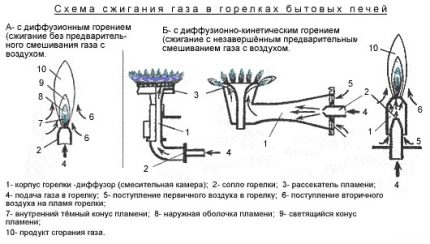
According to the device, the gas stove burners may differ, depending on the features of the models and the possibility of adjusting the flame, but the main details are present in all products:
- nozzleperforming control over gas flow at operating pressure parameters;
- diffuser (with or without a gate), in which the gas is mixed with the primary air;
- body - the chamber where the process of mixing gas with air ends.
The gas-air mixture is discharged into the combustion zone through openings that are located around the circumference of the upper edge of the burner.
Slotted fire holes on top are covered with a steel cover that performs protective and distributing functions.
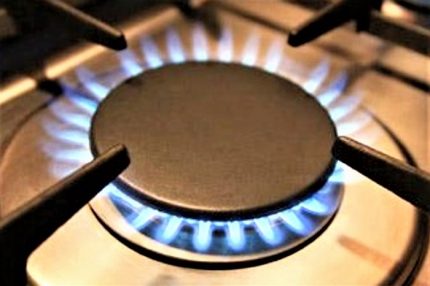
The general structure of burners for domestic gas stoves designed to work on propane-butane is slightly different from analogues for natural gas.
Despite the strict rules for the production of gas stoves, the requirements for efficiency are not so high - only 56%.
When burners with a pilot flame appeared, some elements of the burners were considered inappropriate - for example, a gate. Instead of a gate, two holes at the inlet end of the mixer are responsible for injecting primary air.
Oven device
The oven is designed for baking dough products, baking meat, fish, vegetables, etc. By design, it resembles an ordinary cabinet, but the shelves are made in the form of gratings that do not impede the free circulation of heated air.
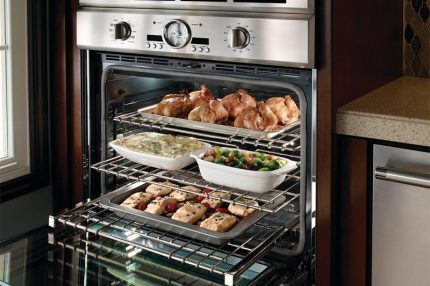
To maintain the necessary stable heating, it is equipped with a gas burner that is different in design from the burner burners.
The heating itself is due to circulating hot gases.
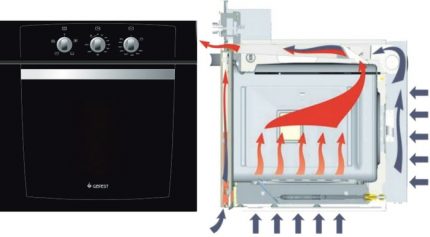
In modern models, one of the frying burners is located in the upper part of the cabinet, which contributes to the baking of products from all sides. The upper arrangement is also characteristic of ovens with the grill function.
In domestic stoves installed burner disc type with a pilot flame.
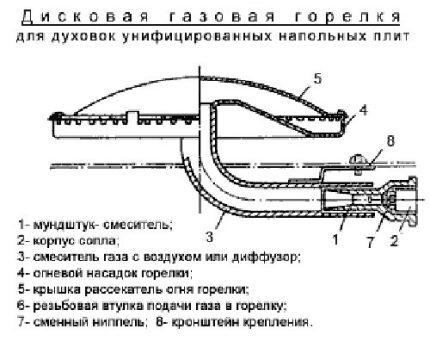
The main burner, which is usually set on fire manually or automatically, is equipped with thermocouple and ignition tube. A radiator with a screen is installed on the frying top burner.
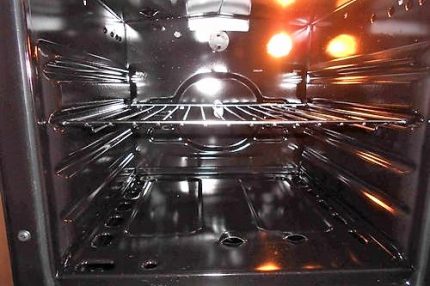
For our own benefit, we recommend that you learn more about the device of the gas stove oven - this can come in handy for minor self-repair or choosing new equipment.
It must be remembered that the process of using the oven is accompanied by the implementation of the rules. For example, you can’t open the door while cooking - this dramatically reduces the temperature and affects the baking process.Do not leave extra shelves or dishes in a working oven - this also negatively affects the result.
The typical design of the stove also involves the presence of a drawer under the oven, the purpose of which can be found in of this material.
Electrical control and monitoring system
In the cheapest stoves, electronic control is not provided - the whole process is regulated mechanically. More expensive models connect an electrical system to enable functions. electric ignition and lighting ovens as well skewer control.
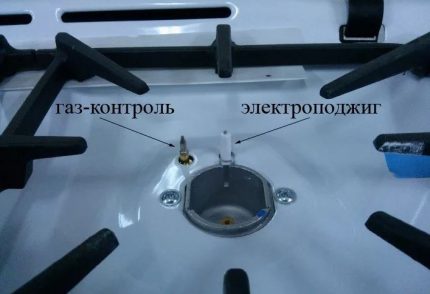
Some users are so used to the auto ignition system that they get lost when the power is turned off and do not know how to turn on the gas. This is done simply: the control knob must be put into working position, and then quickly bring a lit match to the divider.
The backlight function works in different ways: in some ovens it is turned on by pressing a button, in others it is switched on automatically, each time the oven is turned on.
Very useful gas control, whose work is carried out by a thermocouple.
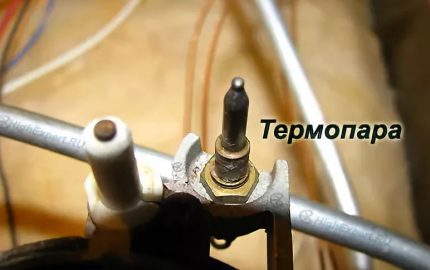
The most expensive models are equipped with electronics, which facilitates both the cooking process and equipment care.
Using the panel with buttons and display, you can control all processes, among which may be the following:
- timer;
- delayed launch;
- steam oven cleaning;
- several cooking modes;
- light and acoustic alarm;
- electronic temperature control;
- quick cooling system, etc.
If the stove is inexpensive, but provided with electronics, you should ask yourself the question: how often will you have to contact a service center? Because electronic equipment, according to statistics, breaks much more often than usual.
Cooker Selection Criteria
Consider the features of gas stoves that do not relate to their technical characteristics, but relate exclusively to the design.
Design, content, arrangement of elements are no less important than power or the number of operating modes.
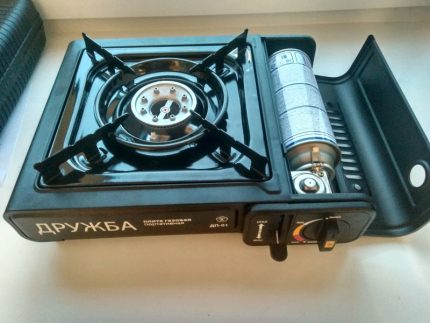
For continuous use, you must choose a reliable functional unit of a proven brand. To do this, you can read reviews and reviews, in large quantities posted on the network.
When buying from a design point of view, pay attention to criteria such as:
- dimensions of the stove in general and the hob in particular;
- oven volume;
- set of accessories for the oven;
- control panel location;
- the location of the pipe for connecting to gas;
- the possibility of replacing burners for operation with bottled gas;
- number and size of burners.
Any unaccounted for trifle in the future can cause discomfort and dissatisfaction with the work of the stove, so try to think through everything in advance.
Rules of operation and repair
Serviceability of the equipment and your personal safety largely depends on how you feel about the equipment. This includes proper installation, gentle operation, regular maintenance and replacement of parts with a limited lifespan.
Here are the basic rules for using a gas stove:
- regularly clean the grate, surface of the stove, burner, control knob;
- keep in touch with representatives of Gorgaz and regularly carry out technical maintenance;
- ventilate the room, even if using a hood;
- in case of prolonged absence, close the shut-off valve;
- make sure that the handles are in the “off” state while the stove is not in use.
Care must also be taken in the operation of the oven. He, like any equipment, requires the cleanliness and serviceability of all parts.
They do not recommend using the oven as an ordinary cabinet for storing dishes, especially cluttering it with easily combustible or melting objects.
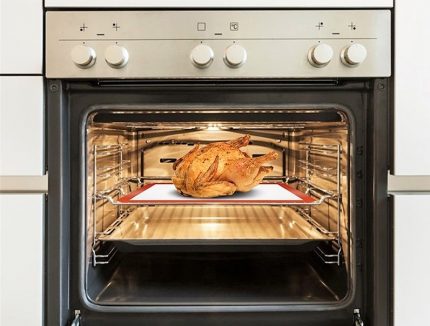
If ventilation is faulty and it is not possible to open a window or window, it is forbidden to use gas equipment.
If there is a specific smell of gas, it is necessary to turn off the fuel supply valve, open the windows and call the emergency service. During the waiting period, you can not turn on electrical appliances, light a flame, but it is better to completely leave the room. Even a call is recommended to be made from the landing or from the street.
Repair of gas equipment must be handled either by invited specialists from the service organization, or by employees of a specialized service center.
Conclusions and useful video on the topic
Useful cooking tips:
How to replace jets when switching to liquefied fuel in cylinders:
A gas stove is a complex household appliance that requires familiarity with both the design features and operating rules. Before you start using this necessary kitchen equipment, we recommend that you carefully study the manufacturer's recommendations, ask the gas service worker questions of interest, and learn how to control the stove.
Remember that gas equipment, along with electric, is dangerous to health and life of household items, so follow the rules of use and timely inform about a potential threat!
If you still have questions about this article or you can give valuable advice on the care or selection of a gas stove, please leave your comments in the block under the article.

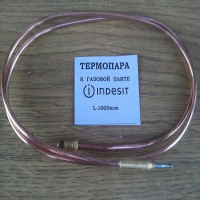 Thermocouple in a gas stove: principle of operation + instruction on replacing the device
Thermocouple in a gas stove: principle of operation + instruction on replacing the device 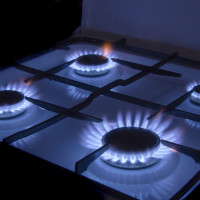 Remaking a gas stove for bottled gas: how to rearrange nozzles for working on liquefied fuel
Remaking a gas stove for bottled gas: how to rearrange nozzles for working on liquefied fuel 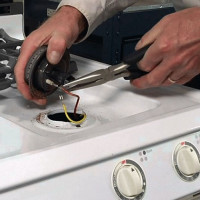 Why the gas stove does not hold the flame, the oven goes out and the burner goes out: an overview of the reasons and repair tips
Why the gas stove does not hold the flame, the oven goes out and the burner goes out: an overview of the reasons and repair tips 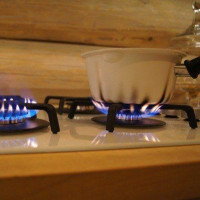 Why smokes a gas stove with a propane tank: basic breakdowns and troubleshooting tips
Why smokes a gas stove with a propane tank: basic breakdowns and troubleshooting tips 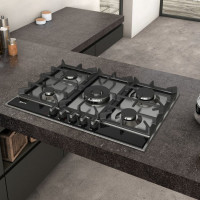 Which is better - gas stove or gas panel: criteria for comparing appliances + recommendations for customers
Which is better - gas stove or gas panel: criteria for comparing appliances + recommendations for customers 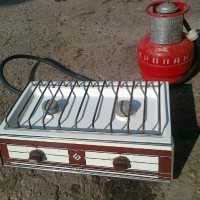 The best gas stove for giving a balloon: TOP-10 of the best models + recommendations for customers
The best gas stove for giving a balloon: TOP-10 of the best models + recommendations for customers 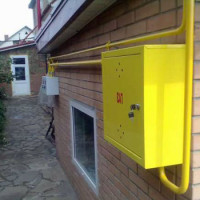 How much does it cost to connect gas to a private house: the price of organizing gas supply
How much does it cost to connect gas to a private house: the price of organizing gas supply  The best washing machines with dryer: model rating and customer tips
The best washing machines with dryer: model rating and customer tips  What is the color temperature of light and the nuances of choosing the temperature of the lamps to suit your needs
What is the color temperature of light and the nuances of choosing the temperature of the lamps to suit your needs 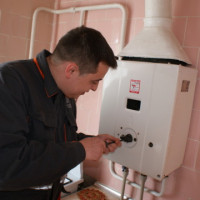 Replacement of a geyser in an apartment: replacement paperwork + basic norms and requirements
Replacement of a geyser in an apartment: replacement paperwork + basic norms and requirements